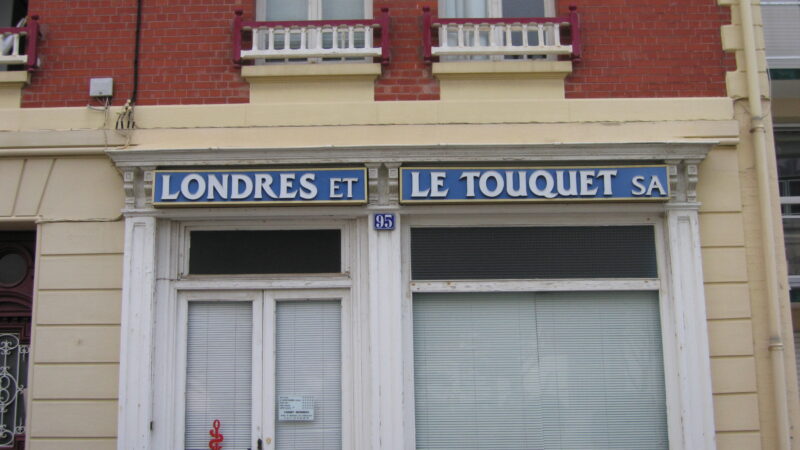Why France would be foolish to tear up the Le Touquet agreement while Britain’s legally still in the EU

2017 is election year in France. Le Pen is stealing votes from the traditional republican right and Nicolas Sarkozy, never one to shy away from stealing ideas to the right of him, thinks that he’s on to something to promise to tear up the Le Touquet agreement between the UK and France and that this would mean the Calais ‘Jungle’ camp would then have to move to the UK. The Le Touquet agreement is part of the system of juxtaposed border controls between France and the UK. Cazeneuve, Hollande’s interior minister, is also not opposed to the idea apparently. The Brexit vote of course the French cover for floating these ideas. The UK government, The Guardian reports, is standing firm opposing Sarko’s plan.
First of all, can the French actually tear up the Le Touquet agreement or, to give it the full name, Treaty between the Government of the United Kingdom and the Government of the French Republic concerning the implementation of frontier controls at sea ports of both countries on the Channel and North Sea. The answer – as given in Article 25 of the text (PDF here, see page 12 of 13), is yes, if 2 years of notification is given – thanks @SteveLawrence_ for the reference.
But then comes the more complicated issue. Why would France want to terminate the agreement? And would it even work?
Here we need to take a step back.
Why is the ‘Jungle’ camp at Calais and not, for example, at Cherbourg or Le Havre (other French ports that have sailings to the UK) or indeed in another EU country? There is a ferry route from Hoek Van Holland to Harwich, and one from Sandander in Spain to Portsmouth – why have the refugees not moved there? No continental European ports other than Calais is covered by the Le Touquet agreement. As the refugee flows across Europe in the summer of 2015 showed, refugees are enterprising and mobile, and shifted themselves en masse to the routes of least resistance.
But in Calais they are staying put. That is because the Le Touquet agreement actually makes not a blind bit of difference to the plight of these refugees.
It works like this. France is in the Schengen system, and Schengen has exit as well as entry controls. France, like the rest of the EU, is subject to the Dublin Regulation that stipulates that a refugee must make an asylum application on the territory of the Member State on which they find themselves.
So if a refugee walks up to the French exit border control at say, Cherbourg, or at Calais, the result is going to be the same – he or she is going to taken into the French asylum system as a result of the Dublin Regulation, and will not even get out of France. Whether the UK border control is on the French side of the channel (as it is for Calais-Dover), or on the UK side (as it is for Cherbourg-Portsmouth) makes no difference whatsoever. The refugee is not even going to be able to even get to the UK border control – if the French are doing their exit controls in compliance with EU law.
So could the French turn a blind eye? For the moment no, they could not. Because if they did they would be in contravention of the Schengen Borders Code on how exit checks are done, and also in contravention of the Dublin Regulation. So the European Commission (probably with information supplied by the UK) could take France to the European Court of Justice, and France would lose.
Now of course I would not put it past Sarkozy to try some populist manoeuvre to win a few votes, but tearing up Le Touquet is not possible before the 2017 election anyway (due to the two year period), and would not – legally – work afterwards anyway, at least while the UK remains legally within the EU. All of that could of course change on the day the UK legally leaves the EU (if that does ever happen) as some deal on UK access to the Schengen zone would have to be brokered. But for now the Le Touquet agreement ought to be safe because ending it won’t end the ‘Jungle’.
Which leads us to two further issues. Why did the Le Touquet agreement make any sense in the first place? The answer to that was because the juxtaposed controls system started with regard to the Channel Tunnel and allowing speedy exit from the tunnel on either side (as explained here), and the Le Touquet agreement that applies to ferries then followed. The second issue then is why is the ‘Jungle’ in Calais? Actually for the very same reason – Dover/Folkestone – Calais is by far the most economically significant crossing from the UK to continental Europe, and just as that necessitated a system to speed up the passage of legitimate traffic, so if you are a refugee and you want to stow yourself in the back of a lorry and try to evade detection, you go to the border with the largest amount of freight traffic. Calais.
So that’s why the camp is not moving, will not for the foreseeable future, and why Sarkozy threatening to tear it up makes no sense. It would only make things slower at the border, and that makes no sense for legitimate economic trade.